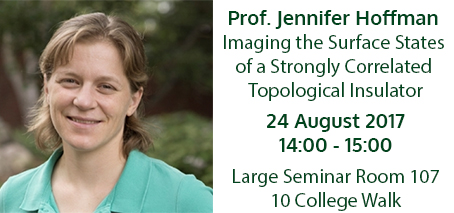-
FLEET & MCATM Research Seminar: Jennifer Hoffman
24 Aug 2017
2:00 pm - 3:00 pm
Imaging the Surface States of a Strongly Correlated Topological Insulator
Hear how Harvard physicists study electron behaviour within exotic materials such as topological insulators.
Please click here for Seminar flyer. All welcome.
Abstract: The prediction and subsequent discovery of topological band insulators with robust spin-polarized surface states has launched a new subfield of physics over the last decade. In the last few years it has been recognized that when topology is combined with strong electron-electron correlations, even more interesting and potentially useful states of matter can arise, such as new topological classifications, fractionalized states, and many-body localization that preserves the topology of the insulating state against thermal destruction. Here I will give a general introduction to topological materials, and show the first direct proof of a strongly correlated topological insulator. Using scanning tunneling microscopy to probe real and momentum space structure, our measurements on the heavy fermion material SmB6 reveal the evolution of the insulating gap arising from strong interactions, and a surface state with Dirac point close to the chemical potential. Our observations present the first opportunity to explore a strongly correlated topological state of matter.
About the speaker: Professor Jenny Hoffman is interested in how electrons behave within exotic materials. Her research team at Harvard has designed and constructed three low-temperature scanning probe microscopes to visualize and manipulate this behavior directly. Innovative techniques include quasiparticle interference imaging to extract the band structure of materials at the nanoscale, and force microscopy to trigger nanoscale electronic phase transitions. Materials of particular interest include high temperature superconductors, topological insulators, and strongly correlated vanadates, all of which present deep physics questions as well as potential for novel applications.
At FLEET Topological insulators are studied to develop electronic devices in which electrical current can flow with near-zero resistance. Unlike conventional insulators, which cannot conduct electricity, topological insulators conduct only along their boundaries, while in their centre, they behave as an insulator. The edge of a topological insulator conducts electrons in one direction only, and thus has none of the electron scattering that causes dissipation and energy loss in conventional materials.
Visitors & parking at Monash Clayton Visitors are very welcome to attend seminars. A map of the Clayton campus can be found online. There are designated visitors car parks in the “N1” building (marked in blue, towards top left of the map) just west of the New Horizons Building. Visitor spaces are available on the ground floor (limited spaces, enter off Research Way gate 10) and top floor (level six, lots of spaces, enter via gate 2 off Innovation Walk). Tickets are $10/day or $2/hour, available from machines. More information.
Venue: Seminar Room 107, School of Physics and Astronomy
Address:

